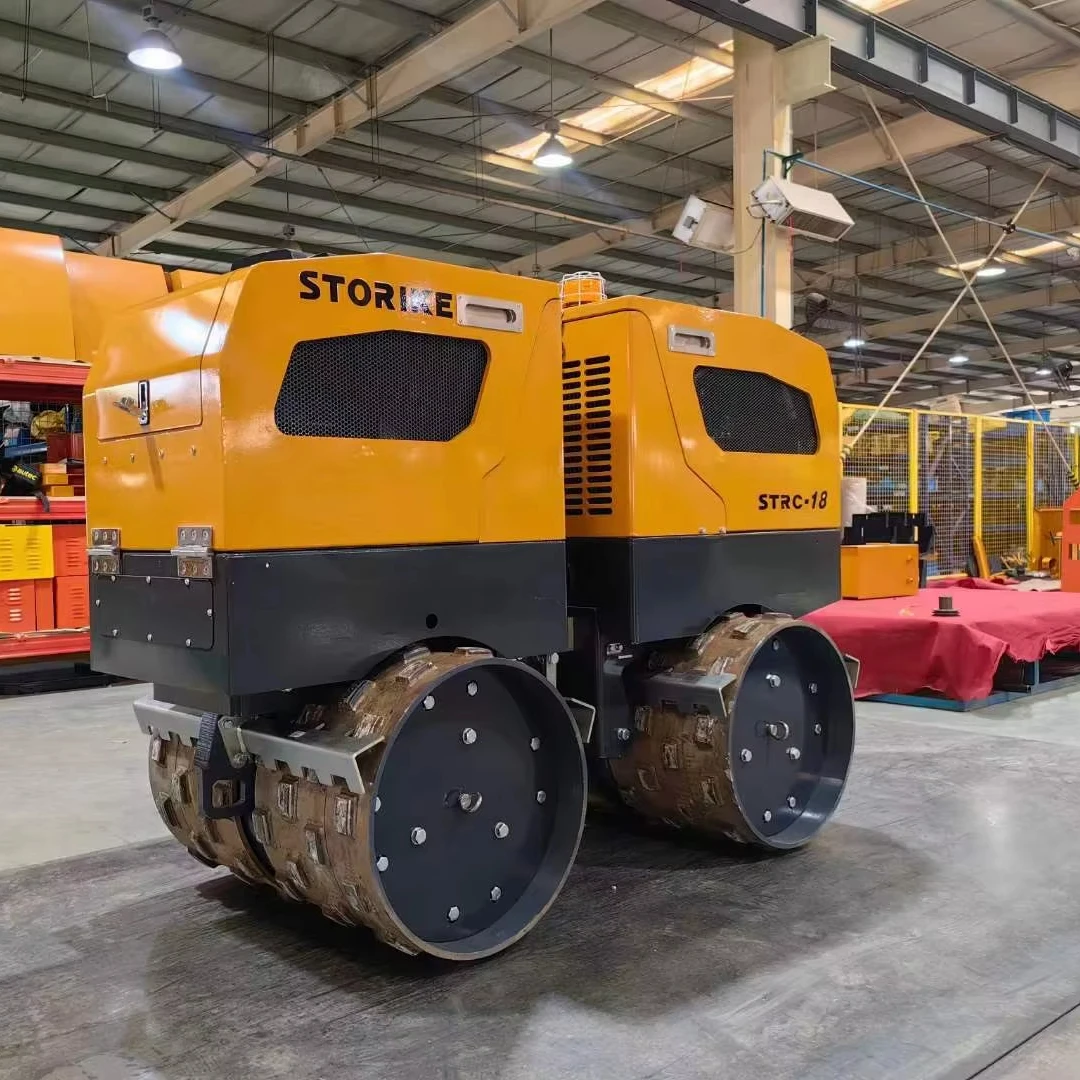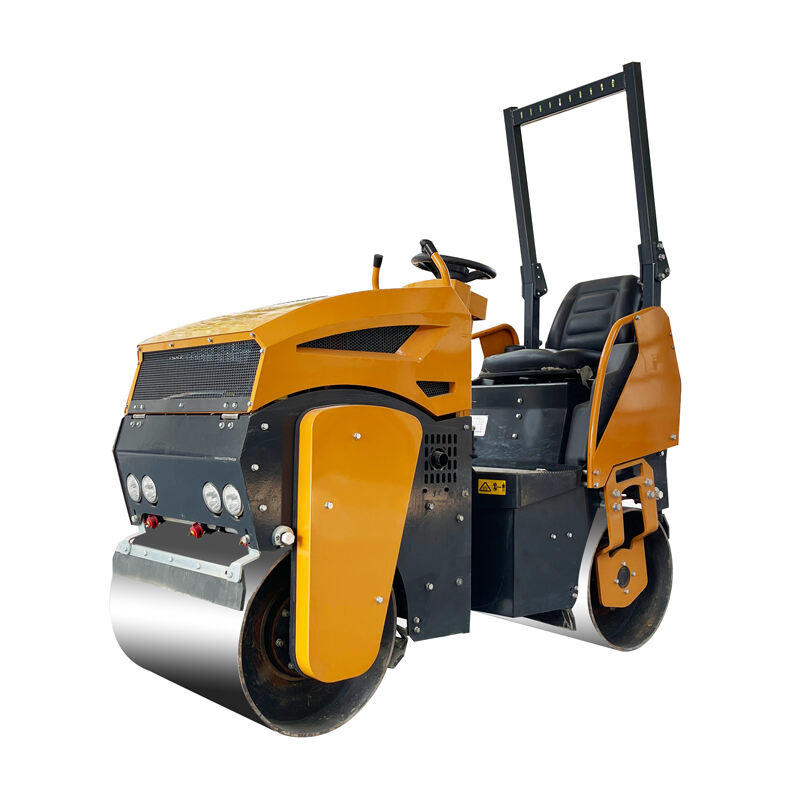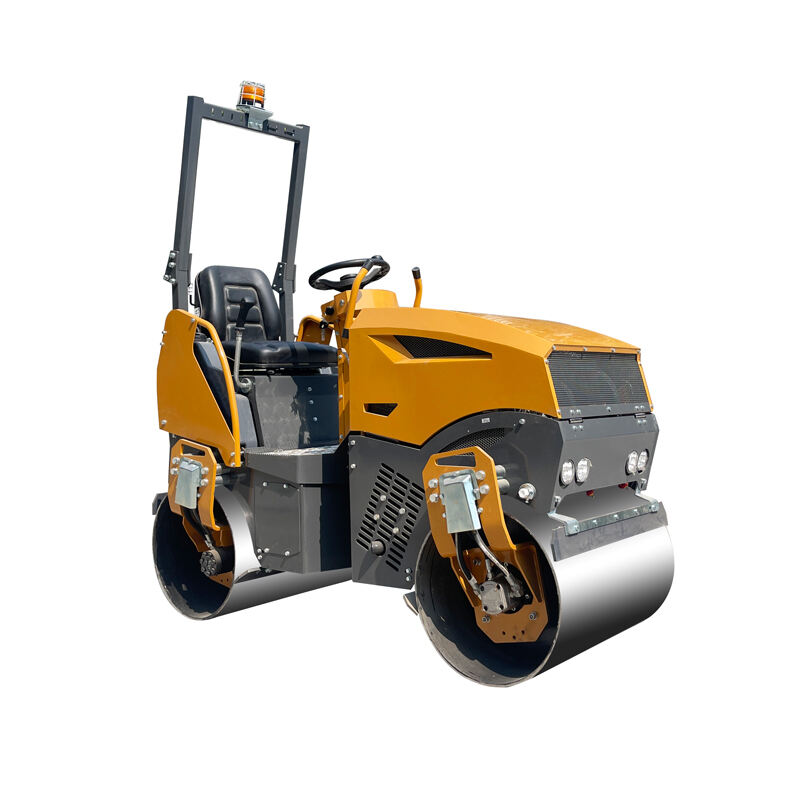The Evolution of Road Rollers in Modern Construction
Early Mechanization: Steam and Animal-Powered Rollers
Road rollers started evolving back when steam power and animals were used to compact surfaces during the 1800s. These early models represented quite an improvement over doing everything by hand, since they could pack materials faster and more evenly across roads and pathways. While steam powered versions were pretty heavy and awkward to handle, they definitely brought more muscle to the job than any group of workers ever could. One example worth mentioning is the Aveling and Porter model from way back in 1867 which actually set the stage for today's compacting equipment. Companies like Thomas Aveling really pushed forward in this field, creating machines that somehow managed to mix powerful steam engines with straightforward designs that lasted through countless construction projects.
Internal Combustion Revolution (1900s-1970s)
When road rollers switched from steam power to internal combustion engines back in the 20th century, it really changed everything for construction equipment design. The move brought much better efficiency on job sites and allowed machines to handle tougher tasks than ever before, basically rewriting what people expected from road building gear. Around 1970 most contractors had ditched the old steam models entirely for these newer combustion powered rollers. Production just took off because they worked so well day after day with minimal fuss. Companies like Caterpillar started making serious waves in the market around this time too. Their machines held up under brutal conditions while competitors such as BOMAG came along with similar reliability but slightly different approaches to vibration technology that would define the next generation of compaction equipment.
Vibratory Systems and Hydraulic Precision
When vibratory systems first came into play, they really changed how we think about compaction work. These rollers use weights that go back and forth to pack materials tighter, which makes them much better at asphalt laying and road construction tasks. When paired with hydraulics, operators can adjust just how hard the machine presses down, so it works well on different kinds of surfaces and materials too. Some actual field tests from recent road projects show these combined systems can actually increase compaction speed by around 30 percent. That kind of improvement means modern road rollers have become pretty much essential for anyone doing serious engineering work on roads these days.
Intelligent Compaction and GPS-Guided Systems
Smart compaction monitoring tech has completely changed how we check quality during road building work. These systems gather live data as the job happens, letting workers know where the ground isn't packed tight enough so they can fix those spots right away. Most contractors now use GPS guided rollers to get better results from their compaction efforts. This means less wasted materials and faster completion times overall. Take XYZ Construction for instance they recently started using systems that sync roller movements directly with blueprints, making sure every inch gets covered properly especially important on big highway projects. Looking ahead, there's no doubt these tools will keep getting better at cutting costs while speeding things up across the board. We expect to see even smarter systems down the line that learn from past jobs and adjust automatically based on site conditions, though getting all departments to adopt them smoothly remains a challenge for many companies still relying on traditional methods.
Electric/Hybrid Rollers for Eco-Conscious Projects
More and more construction sites are switching to electric and hybrid road rollers these days because green building practices have become so important. The difference these machines make is pretty impressive actually they cut down on emissions and burn way less fuel than old school diesel models. Some studies show electric versions can slash carbon output by around half which explains why so many green focused projects now specify them. Take the new downtown expansion project as an example. When they used electric rollers there, besides cutting pollution levels, they saved money on running costs too. Going green isn't just good for the planet anymore. Companies find that cleaner tech helps meet those tough sustainability targets while also ticking boxes for regulators, especially when working near protected natural areas or historic sites where permits can be tricky to get.
Remote Control for Tight Spaces and Safety
The use of remote control tech in road rollers brings some serious benefits, especially when working in those tight job sites where getting around with big machines is basically impossible. With these systems, operators can manage the equipment from afar, which makes things much safer overall and cuts down on accident risks. Workers aren't standing right next to massive rolling machines anymore, so the whole worksite becomes less dangerous day to day. Some industry reports show accident rates drop by around 30% at sites using this kind of remote setup. Another plus point? The machines handle tighter spaces way better than traditional methods ever could. They just move through narrow spots and corners with far more accuracy. And as construction projects keep getting squeezed into smaller areas while still needing strict safety standards, remote controls aren't just going to stay around they're probably going to become standard practice across the board.
Hot Sale Remote Control 1.8Ton Road Roller
What makes the Hot Sale Remote Control 1.8 Ton Road Roller stand out? Look no further than its impressive specs designed specifically for road building projects. At its heart sits a powerful YANMAR engine paired with a reliable Japan-made Shimadzu hydraulic motor that pumps out around 17.8 kW of power. The machine's body is built with ergonomics in mind too, featuring a sleek profile that gives operators a great all-around view while working on site. Safety and productivity go hand in hand here. What really catches attention though is the wireless remote control system. Operators can start and stop the engine remotely, move the roller forward/backward, and even adjust vibrations from a distance. This comes especially handy when maneuvering in confined areas where traditional controls would be tricky. We've seen these machines doing great work across different countries including Thailand, Germany, and parts of Russia where space constraints are common challenges.
ST1000 | 1 Ton Vibratory Roller
The ST1000 1 Ton Vibratory Roller works great on those smaller road jobs where space matters. It comes with a strong engine from Caterpillar, which many contractors trust. What makes this little machine stand out is its twin drum system that really packs down the material without leaving gaps. The control panel isn't just there for show either it lets operators start things up with just a touch, something that saves time when working tight schedules. And don't forget about those late night shifts the lights on both ends mean workers can keep going long after the sun goes down. People who have used this roller talk about how easy it handles around corners and curves, plus the build quality means it lasts through tough conditions. No wonder so many folks reach for the ST1000 when they need precise compaction work done right.
ST1200 | 1.2 Ton Articulated Compactor
The ST1200 1.2 Ton Articulated Compactor really shines thanks to its clever design that works well on different surfaces like asphalt roads and gravel paths. Powered by a trusted Caterpillar engine, this machine lasts longer than most competitors while delivering solid performance day after day. Operators appreciate the comfortable controls and easy-to-reach buttons on the dashboard, making it simple to handle even in tough conditions. Night work gets easier too with better lighting options built right into the unit. Contractors find this compact yet powerful machine handles everything from fixing potholes to compacting gravel bases for new driveways. Many professionals swear by it because it saves time and money on jobs where traditional compactors would struggle or take extra passes.
ST1300 | 1.3 Ton CE-Certified Roller
The ST1300 1.3 Ton roller has CE certification which means it ticks all the boxes when it comes to meeting tough industry safety requirements. Project managers know they can trust this machine because it passes those strict tests. What really stands out about this model is the powerful KUBOTA engine under the hood plus the thoughtful design that actually makes operating it less tiring on long days at the job site. Operators get better visibility too, so they can see exactly where they're working. Contractors find this equipment works well across different jobs from big highway projects down to patching potholes. The build quality holds up over time even through rough conditions, making it worth the investment for anyone who needs dependable compaction results without constant breakdowns or maintenance headaches.
The Future of Compaction: Trends to Watch
AI-Powered Autonomous Rollers
Road rollers are changing fast thanks to artificial intelligence, marking what many see as the start of self-driving construction gear. These smart machines offer real advantages too. They work faster and save money on wages since fewer workers need to be onsite. Plus, they pack down roads with much better accuracy than traditional methods allow. Industry insiders think we'll see AI take over most construction equipment within just a few years. How companies run their projects will look completely different then. According to research from Construction Technology Review, some sites using automated rollers saw around 30% savings on labor expenses. At the same time, these sites finished jobs quicker because the machines performed so consistently without breaks or errors.
3D-Printed Parts and Lightweight Materials
Adding 3D printed components to road roller production is changing how manufacturers approach their craft, making it possible to build far more intricate and effective designs than before. We're seeing lightweight materials become a big deal in this industry too, directly affecting how much fuel these machines burn and how well they can move around job sites. Take aluminum alloys and composite materials for example these have really opened up new possibilities for engine designers, leading to road rollers that weigh less but still pack serious power. Several construction firms including XYZ Constructions have started using these innovations in their operations. Their reports show roughly 20 percent better fuel economy compared to older models, plus significantly less waste during production according to findings published recently by the Journal of Advanced Manufacturing.
Smart Fleet Management via IoT Networks
IoT tech has become pretty essential for managing modern fleets, especially when it comes to connecting road rollers across extensive networks that allow for real time monitoring and data analysis. These connected systems make life easier for operations teams and maintenance crews because they cut down on manual tracking work and let them predict problems before they happen. Take ABC Engineering as an example they rolled out IoT solutions last year and saw their fleet management get much better. Their mechanics spend less time chasing down equipment issues now, which saves money on repairs and keeps machines running longer between service checks. A recent study from Construction Management Quarterly points out something interesting too: companies integrating IoT into their workflows typically see around a quarter improvement in how efficiently things run day to day. That kind of boost means more jobs get done without breaking the bank on extra resources.
 EN
EN
 AR
AR CS
CS DA
DA NL
NL FI
FI FR
FR DE
DE IT
IT NO
NO KO
KO PL
PL PT
PT RO
RO RU
RU ES
ES SV
SV TL
TL ID
ID LV
LV SR
SR SK
SK SL
SL VI
VI SQ
SQ ET
ET TH
TH TR
TR AF
AF MS
MS GA
GA HY
HY KA
KA BS
BS LA
LA MN
MN MY
MY KK
KK UZ
UZ KY
KY











